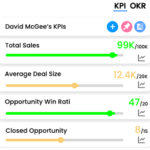Key Performance Indicators Examples

Net Promoter Score (NPS)
Net Promoter Score (NPS) is a customer loyalty metric that measures the likelihood of customers recommending a company’s product or service to others. It is used to measure customer satisfaction and loyalty, and to identify areas where the company could improve its product or service.
The formula for Net Promoter Score is:
NPS = (Percentage of Promoters – Percentage of Detractors)
It is calculated by asking customers to rate their likelihood of recommending a company’s product or service on a scale of 0 to 10, where 0 means “not at all likely” and 10 means “extremely likely.” Customers who rate the company 9 or 10 are considered “promoters,” those who rate the company 7 or 8 are considered “passives,” and those who rate the company 0 to 6 are considered “detractors.”
The NPS is calculated by subtracting the percentage of detractors from the percentage of promoters. For example, if a company has 100 customers and 20% of them are promoters, 60% are passives, and 20% are detractors, the NPS would be (20 – 20) = 0.
Net Promoter Score is an important metric for companies because it allows them to measure customer satisfaction and loyalty, and to identify areas where the company could improve its product or service. It’s also important to track the NPS by different segments, such as demographic, geographic, or behavior groups, in order to identify where the problem is and take action to increase the NPS.
Measure what matters for your business with KPIs
Track business performance with real time key metrics against targets in one place without the need for multiple dashboards or reports
